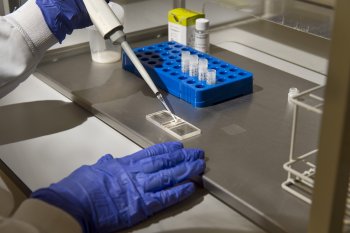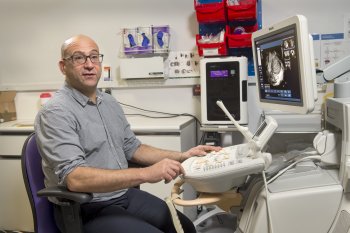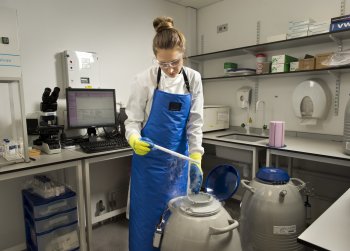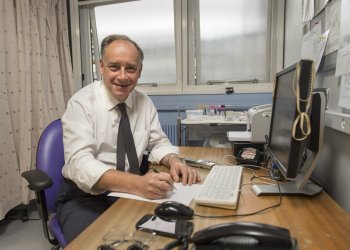What we do

Diagnosis
We will attempt to diagnose the cause of your infertility via a consultation followed by a series of investigations. The testing we offer includes:- reproductive hormone assays
- ovulation monitoring
- ovarian reserve testing (Anti-Mullerian hormone). This is not covered by the NHS unfortunately, and you will be charged a fee for this particular test. It is not a requirement for you to have this test done but we can help to facilitate on request.
- gynaecological imaging
- tubal patency assessment - HyCoSy or HSG
- semen analysis
- comprehensive urological assessment and investigation (for male patients/partners)

Treatments
We can offer onsite treatment for a wide range of fertility problems, as listed below.
Ovulation disorders
The most common reason for a delay in conceiving is problems with ovulation, and the main cause of this is polycystic ovarian syndrome. We have a great deal of experience in managing ovulation disorders with metformin, letrozole tablets and hormone injections. We strive to correct ovulation dysfunction wherever possible; sometimes combining drug therapy with follicle tracking. This can also be offered in conjunction with intra-uterine insemination (IUI).; however, this part of the treatment does not have NHS funding available. As a result of our services, we have helped many of our patients avoid the need for IVF.
Ovulation disorders
The most common reason for a delay in conceiving is problems with ovulation, and the main cause of this is polycystic ovarian syndrome. We have a great deal of experience in managing ovulation disorders with metformin, letrozole tablets and hormone injections. We strive to correct ovulation dysfunction wherever possible; sometimes combining drug therapy with follicle tracking. This can also be offered in conjunction with intra-uterine insemination (IUI).; however, this part of the treatment does not have NHS funding available. As a result of our services, we have helped many of our patients avoid the need for IVF.
Endometriosis
The treatment of endometriosis is another area in which we have special expertise. We can help you tackle endometriosis using a multi-disciplinary approach which gives you access to a dedicated radiologist, a laparoscopic general surgeon, a gynaecological surgeon and a counsellor.
Fertility surgery
We offer a range of open or minimal access surgical procedures including ovarian drilling, tubal surgery, removal of endometriosis and resection of uterine septae. We also have particular expertise in keyhole surgery for uterine fibroids.
Recurrent miscarriage
Recurrent miscarriage is the term we use to describe the occurrence of three or more miscarriages with no live birth in between. We can investigate the possible causes of these miscarriages and offer medical and surgical treatment where appropriate.
We offer a range of open or minimal access surgical procedures including ovarian drilling, tubal surgery, removal of endometriosis and resection of uterine septae. We also have particular expertise in keyhole surgery for uterine fibroids.
Recurrent miscarriage
Recurrent miscarriage is the term we use to describe the occurrence of three or more miscarriages with no live birth in between. We can investigate the possible causes of these miscarriages and offer medical and surgical treatment where appropriate.
Intra-uterine insemination (IUI)
The chances of conception can be maximised in certain groups of patients by placing sperm directly into the uterus at or around the time of ovulation. This can be done either in a natural menstrual cycle, or after stimulating the ovaries with fertility drugs. This treatment is only available through self-funding as it is not covered by the NHS.
The chances of conception can be maximised in certain groups of patients by placing sperm directly into the uterus at or around the time of ovulation. This can be done either in a natural menstrual cycle, or after stimulating the ovaries with fertility drugs. This treatment is only available through self-funding as it is not covered by the NHS.
Donor insemination
We have a dedicated sperm donor bank on site and offer IUI with donor sperm.
If you are interested in using donor sperm, and wish to undergo treatment either here or at another UK centre, please contact us for details of this service: donorbank.whittington@nhs.net.
For an overview of what treatments are funded by the NHS and what treatments are not funded by the NHS, please see the North Central London Integrated Care Board (NCLICB) funding details for fertility.

Male fertility preservation
We offer long-term sperm storage for men who need to undergo chemotherapy, radiotherapy , hormone therapy, or surgery which may affect their fertility. This can be done urgently if required. For further details about this service please email whh-tr.fertilityunit-whitthealth@nhs.net.
Referral for IVF

If we believe you may benefit from IVF or ICSI treatment, then we will help you determine whether or not you are eligible to access NHS funding. Inclusion criteria varies – for more information, click here.
If you are eligible, we will refer you to an IVF provider. If you do not meet the requirements for NHS IVF, then we will advise you on the self-funded options available to you.
You can find out more information on self-funded IVF treatment on the HFEA website.
*********************************************************
Summary Assisted Conception Changes - Assisted conception services
Since 21 August 2017, those exempt from charge under Regulation 10 (health 5.15.surcharge arrangements) or 11 (transitional arrangements) are not exempt from charge in relation to assisted conception services.
Assisted conception services are defined in the Charging Regulations as any medical, 5.16.surgical or obstetric services provided for the purpose of assisting a person to carry a child. Broadly speaking, this means any medicines, surgery or procedures that are required to diagnose and treat infertility so a person can have a child. It includes procedures such as intrauterine insemination (IUI), in vitro fertilisation (IVF) and egg and sperm donation.
Assisted conception services are defined in the Charging Regulations as any medical, 5.16.surgical or obstetric services provided for the purpose of assisting a person to carry a child. Broadly speaking, this means any medicines, surgery or procedures that are required to diagnose and treat infertility so a person can have a child. It includes procedures such as intrauterine insemination (IUI), in vitro fertilisation (IVF) and egg and sperm donation.
Finally, a person who is exempt under Regulation 10 or 11 and who has begun a 5.22.course of assisted conception treatment before 21 August 2017 will be entitled to the remainder of that course of treatment free of charge. New courses of assisted conception treatment begun on or after 21 August 2017 will not be free of charge and the overseas visitor will be required to pay for that service. It is a clinical decision as to what constitutes a particular course of treatment. Where two people are seeking assisted conception services with NHS funding, and one of the two people is covered by health surcharge arrangements and the other is ordinarily resident in the UK and therefore not subject to charge, the services required by the health surcharge payer will be chargeable. Any services required by the ordinarily resident person will continue to be freely available, subject to the established local or national commissioning arrangements.
****************************************************************
****************************************************************
Support
We want to help you through what we understand can be a challenging time. Our counselling service can assist you in managing any stress associated with your fertility difficulties. We work with individuals and couples using cognitive behaviour therapy, systemic psychotherapy and mindfulness-based approaches.
Our team are on-hand to give advice whenever you may need it. Please feel free to call or email us at any time if you have questions about your investigations or treatment.
Our team are on-hand to give advice whenever you may need it. Please feel free to call or email us at any time if you have questions about your investigations or treatment.
Last updated03 Mar 2025

